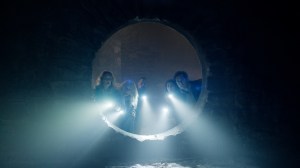When it comes to R-rated movies parents are more than likely willing to show their kids, it comes down to My Cousin Vinny and Planes, Trains and Automobiles. The only thing that keeps either one of them from being a PG-13 is a handful of F-bombs. And, in the case of the latter, the lot of the F-bombs occur in a single, hilarious scene.
Videos by ComicBook.com
The irony is, if viewing all of John Hughes’ filmography in modern times, the majority of his other films are far more offensive. In Sixteen Candles for instance, which is rated PG, there’s drinking, sex, birth control discussions, and even the implication of sexual assault. Oh, and then there’s Long Duk Dong, a character who exists to be both a blatant, racist stereotype and the butt of every joke.
In the case of Planes, Trains and Automobiles, there’s just a frustrated rant from Steve Martin’s character. That’s it. The rest of the movie is, like the remainder of Hughes’ filmography, very sweet-natured, even through the odd-couple tumult of the two leads.
What Is Planes, Trains and Automobiles About? And What’s the Scene in Question?
For the unaffiliated, the narrative follows Martin’s marketing executive Neal and John Candy’s traveling salesman, Del, as they team up to travel to Chicago after their flight is diverted. Neal is a family man, one who has been spending too much time away from that family, and he’s dead set on arriving home for Thanksgiving dinner. Del is slightly more mysterious, at least throughout most of the movie, and when Neal learns the truth about him, he learns that maybe it’s time to put aside his frustrations with this goofy guy and warm up his often-cold heart.
[Related: Steve Martin Declined Offer to Play Tim Walz on SNL Season 50]
The film opens with Neal having a cab ride stolen from him by a fellow big city businessman (played by Kevin Bacon, who would reteam with Hughes on his next film, She’s Having a Baby). But that’s just the start. He had his flight delayed, had another cab ride snatched out from under him, this time by Del (and this time by accident), forced to sit next to that man on his flight, had that flight diverted to Kansas, and forced to spend the night with Del in a dingy motel.
The R-rated scene in question comes after that stay in the motel, a ride on a train that breaks down, and a ride on a stuffed bus. Upon arriving at the St. Louis Airport, Neal loses his final straw: the car he’s rented isn’t in the lot. He approaches the overly chipper car rental employee working the desk, though she seems more interested in her phone call with family than with doing her job. He then unleashes a tirade that begins with telling her to wipe the smile off her face.
What follows is a slew of 18 F-bombs and the name of most popular late ’80s car manufacturers. Then she asks him for his rental agreement, which he’s thrown away, in quite understandable frustration. To that fact she replies that he’s, well, “screwed.” So, make it 19 F-bombs.
By today’s standards, even 19 F-bombs is nothing compared to cultural insensitivity or even the allusion to sexual assault. And rightly so, one’s a word that functions as often innocuous language accentuation more than anything else while the other two are, well, a heartbreaking mentality and action that is to this day very much present in the real world. Even still, the MPA is what it is, and ratings are seldom changed. As it stands, the likelihood of Sixteen Candles being rated R now is greater than Planes, Trains and Automobiles being given the more macro-scale accessible PG-13 rating it deserves.
The general rule of thumb is that more than one F-bomb in a movie warrants an R-rating. Yet, if a young person hears a word once, what makes that different from hearing it 19 times? The only real difference is that, in the case of Planes, Trains and Automobiles, at least, 19 times in a minute-and-a-half works as perhaps the film’s best joke. And it’s something that’s lost if one were to watch the film for the first time in an edited version.








